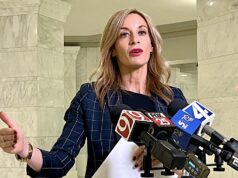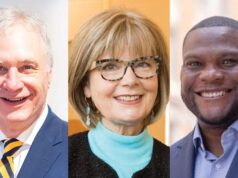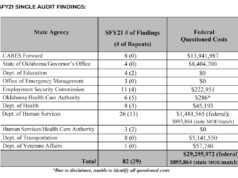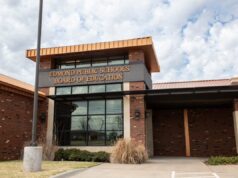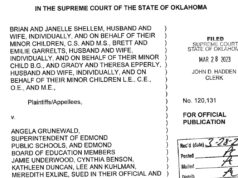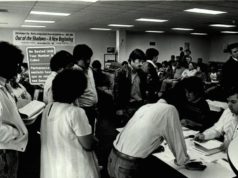This spring, NonDoc held its very first essay contest. We figured students stuck at home because of the COVID-19 lockdown would have a little extra time on their hands and plenty of thoughts about their experiences. So we asked them to send some of those thoughts our way.
We received an overwhelming response. Our 11-14 age category had 96 entries. The competition was stiff, but we’ve finally selected the winners, with a tie for third place. These essayists impressed us with their creativity, their writing skills and their thoughtful reflections on the ways the novel coronavirus pandemic has affected their lives.
Thanks to a sponsorship from OG&E, the winners will be sent a gift certificate to a locally owned restaurant of their choice.
We’d like to send a huge congratulations to the winners and thank everyone who took the time to submit an entry. Below, you can read the winning entries, which have been lightly edited.
Looking from the other way
By Ethan Li
Age 13, Whittier Middle School, Norman
First Place
It was the dullest of times, it was the most exciting of times. While opportunities die, new ones are born.
January 2020. A city at 30 degrees north and 114 degrees west has been thrown into chaos. Everyone is ordered to lock themselves in their house and not visit anyone. This is the city of Wuhan, China, the seed of the COVID-19 pandemic that will wreak havoc upon the globe and instill terror in the hearts of men and women.
March 16th. Italy has a sudden skyrocketing of coronavirus cases. Our spring break trip to Rome is canceled. It is not long after that the US, especially New York, is feeling the clout of the pandemic.
March 25th. Bad news: my 7th-grade year is over because of COVID-19. I’m stuck at home. All the days are the same.
OR ARE THEY?
I am sleepy. But my mother comes bursting into my room and thrusts open the window, letting in piercing sunlight and suddenly I am wide awake. A rather dramatic way to start the day.
Reading is what my mother calls our “happy hour.” Many surprises come from it. Like from a book about Rubens. Known to simultaneously paint, listen to a reading, dictate a letter, and greet newcomers, he was a multitasking genius. Like, was he an alien?
We have a WaterRowerTM machine. After sitting empty for months, my father and I filled it up. But 172,800 seconds later, the inside turned into an algae haven. It wasn’t any type of algae, though, but notorious BLACK ALGAE! A choker of native pond/aquarium life and black as the grim reaper, this algae is very, very resistant to chlorine and other common algae sanitizers. We had to drain all of it.
Sweet air is blown by the soft wind. So I ran three laps around the block. When I finished, my lungs were absolutely convinced they were going to fail. I immediately ran inside and clipped on the oximeter my mom bought and proceeded to be downright stunned as my pulse fluctuated melodramatically. I’d be at 86 BPM and seconds later at 119. The line that showed my pulse did not show smooth, sinuous, uniform pulses, but jagged pulses of different height. But life goes on, I kept running and my body got better.
Running can make you hungry, but…
Who likes to cook every single day? It can get tedious at times. So my mother and my friend Ryan’s mother decided on a plan: take turns cooking dinner for each other. And Ryan and I formed what I call the E.R. Food Express, where we go to each other’s houses to deliver food. It is now dinnertime. I have beef and cabbage. Tonight, I am the one in charge of the Express.
Now you see the variety one single day can have, along with the opportunities it holds. So If you’re bored, next time try thinking “I wonder what the future will hold.”
Positive or negative: The sunny side to COVID-19
Natalie Boyer
Age 12, Fisher Elementary School, Oklahoma City
Second Place
Though many people would say that no good will come out of Coronavirus, I think that this cloud still has a silver lining, in more ways than one. The environment’s air pollution is dramatically decreasing, families are starting to bond more, we start to realize how much we take our freedom for granted, and we get to try new things.
Though it might not seem like it, COVID-19 is helping to improve the environment we live in. Since people aren’t leaving their homes as often as before the pandemic, the amount of carbon dioxide and nitrogen dioxide released into the atmosphere has plummeted in recent months. An estimate shows that China has emitted 25 percent less carbon than usual in a four-week period after the outbreak started. The amount of nitrogen dioxide emitted in France was mapped by the European Space Agency. Images produced by one of their satellites show a great reduction that they say is due to strict quarantine because of the Coronavirus.
With kids running off to after-school activities and parents doing work and paying bills, there’s little time for family bonding. That is, until Coronavirus struck. Coronavirus has forced us to quarantine within our homes with our families. Without being able to go anywhere, there’s more time to spend with the household. As a result, families become closer. My family has made theme weeks, where very week someone gets to choose an activity to do every day. It has helped make my family closer than before.
People in the United States have freedoms that many others do not get to experience. Coronavirus essentially limited our freedom to roam almost wherever we please. The people are confined to their homes unless they need to get groceries and necessary items, like toilet paper and disinfectant wipes. With all this extra time on our hands, we start to think, Is this what it feels like to have little freedom? Why have we never been grateful for how much we have? We then start to really appreciate the life we do have.
Another positive thing about this experience is that people now can try new things that they wouldn’t have otherwise. For example, my mom and I learned how to make bread dough. I’ve learned several new things, such as how to protect my private information. I’ve tried painting and made a creation that I’m proud of. I’ve taken part in a project bigger than myself and helped my community by sewing face masks for health care providers.
These are just some of the good things that have happened because of the Coronavirus. So, if you’re lying around like a couch potato, moping about how much this pandemic sucks, try to look on the bright side. The air is getting clearer, you’ve become closer to your family, you can start to appreciate the freedom you have, and you can try something new and possibly find something you love doing.
The positive things from the pandemic
by Walker Butler
Age 11, Reydon Public Schools, Reydon
Third Place (tie)
As an 11-year-old boy, I had never even heard the word “pandemic.” But one afternoon after school was out, my mom and I were visiting with my grandparents when she got a message from the school principal. He said that school was canceled for the rest of the year because of this COVID-19 Pandemic. I thought, “Oh no, how will I learn without going to school, and what will happen to me and my family?” I was scared.
The thought of doing my school work without a teacher was scary. However, after getting my assignments, my parents and grandparents became my teachers. As we worked online on my assignments, I began quickly to improve my computer skills. Since my parents and grandparents use computers every day at their jobs, I began to learn new technical skills from them. I actually can use these new skills when I return to the classroom.
Without the pandemic, my family and I never would have sat down together at a computer, and I would have never realized what all they know. This homeschooling has given me a deeper understanding of my family’s knowledge as well as new skills.
My family and I live on the family farm, so we are already socially distanced from people. However, the main thing about being socially distanced is that my family and I have gotten closer as we have fed cows, gone fishing, worked in the yard and worked with the animals. I have even learned to drive the tractor, put out hay from the hay stinger and drive the farm Polaris.
Consequently, this pandemic has brought my family closer together and given me new skills that I need to assume more responsibility with the family farm. Since the farm will one day be mine, I am a glad that this pandemic has given me the time to learn some of the skills I will need to perform the day-to-day chores that come with the family farm.
In addition to learning new skills about the computer and farm work, I also have had time to explore areas of the farm that I normally rush by. I have spent many hours at the ponds, in the woods, and in the fields since this pandemic began. My science lessons have come from watching the deer and turkey that come to the yard each morning and from watching the numerous species of birds that come to the feeders each day. I have backed up my exploration with my new tech skills as I have researched the animals I have seen.
This pandemic has been a frightening thing for me. However, it has brought me closer to my family and closer to the great outdoors. I am ready for it to be over and for everyone to be safe and well. However, I am thankful for the positive things it has brought me.
Grow your mind, body and spirit
Mason Taylor
Age 13, Goodwell Public Schools, Goodwell
Third Place (tie)
During a time like this, when you are isolated for an extended number of days, you can have one of two approaches on how to react. You can live a carefree life, or you can respond with meaning and gain a deeper understanding of yourself. In this essay, I will document my experiences and how I have changed for better or worse.
When I heard about this pandemic and how it might affect my daily life, I felt joyful at first. I would no longer have to wake up at 6:30 in the morning and spend eight hours of my life in a building that I wasn’t too fond of. I spent weeks on end living a hectic lifestyle. I thanked this virus for freedom, but reality then began to set in. The things I had a deep love for had become infected by this disease. All the major sports had shut down. The people I looked up to had disappeared.
A quote then came to mind: “You never understand how much you love something until it’s gone.” Whenever I have something on my mind, I go to the gym and shoot baskets. It helps me let out stress and really think. Before I knew it, I was shooting for hours, thinking about how long this would linger on. It was then that a notification appeared on my phone. It read, “Your school schedule will resume online Monday.”
School had rested at the back of my mind for a long time. Now seeing that it was starting back up, I was awed. I had created this dreadful image of school in my mind for so long, and now it seemed tolerable. I thought back to my days walking down the halls and realized that without school, I’m a mess. That place ties my whole life together. It builds character and institutes good morals.
That day, I took immediate action, spending the remaining hours of my day on work. That little notification rejuvenated my spirit and helped me look through a new lens. I then made it my priority that the only things that would consume my time were things I would benefit from. That first step helped me envision a new quarantine life.
The days leading up to that commitment were great at some moments and tougher at others. Temptation constantly lurked in the back of my mind, but the feeling of not giving in was better than anything else. Along with my physical goals came mental goals. I would spend time in prayer for half an hour every day. I listened to podcasts every day and much of my podcast library was sports-related. I knew that I needed to get out of my comfort zone, so I added politics. I decided that I would know any news regarding my country.
In conclusion, regarding life in quarantine, take advantage of free time. Use it to grow your mind, body, and spirit. The first step in solving a problem is realizing there is one.
Check out the age 15-18 winners, too











